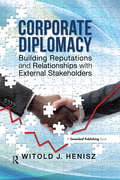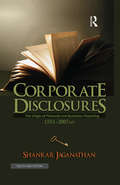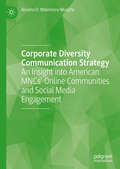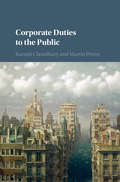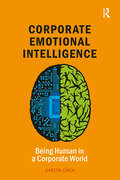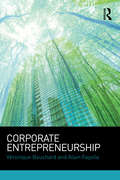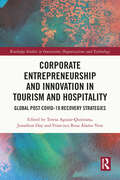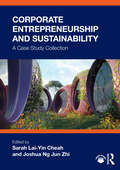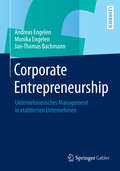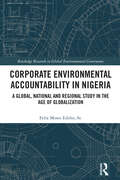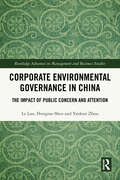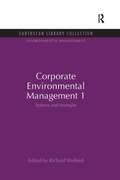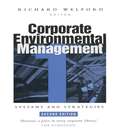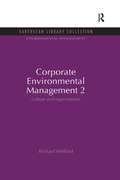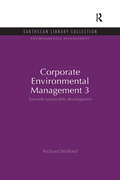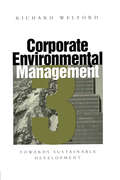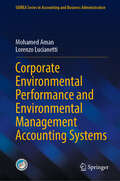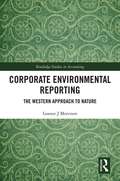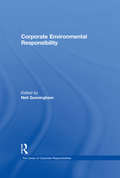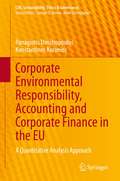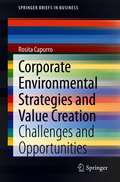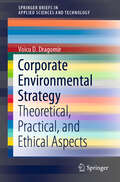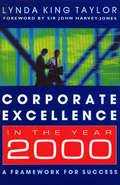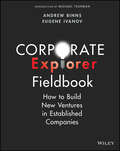- Table View
- List View
Corporate Diplomacy: Building Reputations and Relationships with External Stakeholders
by Witold J. HeniszManagers of multinational organizations are struggling to win the strategic competition for the hearts and minds of external stakeholders. These stakeholders differ fundamentally in their worldview, their understanding of the market economy and their aspirations and fears for the future. Their collective opinions of managers and corporations will shape the competitive landscape of the global economy and have serious consequences for businesses that fail to meet their expectations. This important new book argues that the strategic management of relationships with external stakeholders – what the author calls "Corporate Diplomacy" – is not just canny PR, but creates real and lasting business value.Using a mix of colourful examples, practically relevant tools and considered perspectives, the book hones in on a fundamental challenge that managers of multinational corporations face as they strive to compete in the 21st century. As falling communication costs shrink, the distance between external stakeholders and shareholder value is increasingly created and protected through a strategic integration of the external stakeholder facing functions. These include government affairs, stakeholder relations, sustainability, enterprise risk management, community relations and corporate communications. Through such integration, the place where business, politics and society intersect need not be a source of nasty surprises or unexpected expenses. Most of the firms profiled in the book are now at the frontier of corporate diplomacy. But they didn’t start there. Many of them were motivated by past failings. They fell into conflicts with critical stakeholders – politicians, communities, NGO staffers, or activists – and they suffered. They experienced delays or disruptions to their operations, higher costs, angry customers, or thwarted attempts at expansion. Eventually, the managers of these companies developed smarter strategies for stakeholder engagement. They became corporate diplomats. The book draws on their experiences to take the reader to the forefront of stakeholder engagement and to highlight the six elements of corprate diplomacy.
Corporate Disclosures: The Origin of Financial and Business Reporting 1553 - 2007 AD
by Shankar JaganathanSpanning over two millennia of time and five continents of space, this book narrates the unfolding of financial and business reporting. The first part of the book traces the origin of the 'company' as a form of organization and the evolution of bookkeeping. The second part: The Accounting Edifice, depicts events that led to the disclosure of the balance sheet, the profit and loss account, cash flow statements and the practice of auditing. In the third part: Reaching out to the Shareholders, the author explores the need for governance, reporting of intangible assets and the emergence of annual reports. Indian Corporate Disclosures, the fourth and the last part, sketches the panorama of post-independent dvelopments in Indian corporate disclosures using heritage IT companies, Wipro and Infosys as examples. The last chapter of the book contrasts disclosures by the Indian Sensex companies in 2007 with the best global practices.
Corporate Diversity Communication Strategy: An Insight into American MNCs’ Online Communities and Social Media Engagement
by Roxana D. Maiorescu-MurphyThis book analyzes the brand communities of major American multinationals across three industries: finance, tech, and consumer goods. It assesses how companies communicate their diversity approaches on social media (Twitter) and studies the ensuing perceptions of online users. By comparing more innovative sectors (tech and consumer goods) with a less innovative industry (finance), the author examines differences in the way brands approach and communicate about diversity in online settings. The results of the study lead to the development of a theoretical framework with practical applications for business communication academics and professionals alike.
Corporate Duties to the Public
by Barnali Choudhury Martin PetrinIn a world where the grocery store may be more powerful than the government and corporations are the governors rather than the governed, the notion of corporations being only private actors is slowly evaporating. Gone is the view that corporations can focus exclusively on maximizing shareholder wealth. Instead, the idea that corporations owe duties to the public is capturing the attention of not only citizens and legislators, but corporations themselves. This book explores the deepening connections between corporations and the public. It explores timely - and often controversial - public issues with which corporations must grapple including the corporate purpose, civil and criminal liability, taxation, human rights, the environment and corruption. Offering readers an encompassing, balanced, and systematic understanding of the most pertinent duties corporations should bear, how they work, whether they are justified, and how they should be designed in the future, this book clarifies corporations' roles vis-à-vis the public.
Corporate Emotional Intelligence: Being Human in a Corporate World (Leadership and Executive Coaching through Corporate Emotional Intelligence)
by Gareth ChickAs part of the series Leadership and Executive Coaching, Corporate Emotional Intelligence is a seminal work for business communication, management and organisational behaviour in the 21st Century, setting a new precedent for business leadership and management books. It analyses how human behaviour is conditioned within corporate cultures, how managers come to adopt unconscious controlling habits that are counter-productive and which create cultures of fear. It shows how through the art of coaching and mentoring, breaking habits and personal development, transformational leadership within teams can result and, through theory and practise, shows us how to lead when managing people in the business environment. Unique to this leadership coaching book is the introduction of the Corporapath- the Corporate Hostage and to the anxiety disorder CTSD - Corporate Traumatic Stress Disorder, yielding a profound new level of self-awareness for all corporate citizens. Success now requires a different kind of business intelligence: IQ + EQ is no longer sufficient. We now need CEQ - Corporate Emotional Intelligence - the ability to read, understand and manage the psychological states and behaviours that are unique to corporate cultures and emotionally intelligent leadership.
Corporate Entrepreneurship
by Alain Fayolle Véronique Bouchard<p>Entrepreneurship is vital for companies’ success, to allow them to adapt and grow in today’s interlinked and turbulent business environments. Yet as they grow in size and complexity, many companies become less innovative and more rigid. The challenge of how to deal with these trends has led to the rise of the field of Corporate Entrepreneurship, looking at the development of new business ideas and opportunities within established firms. This book provides an effective entry point to Corporate Entrepreneurship as an academic field and a management practice. <p>Corporate Entrepreneurship leads readers through an overview of real-life Corporate Entrepreneurship; the aims, organisational models, implementation and results. Covering theoretical perspectives, empirical findings and practical concerns, the book also switches between the perspective of the individual and the organisation. Written by two specialists of the discipline, the book includes a wealth of real-life case studies, covering over three decades of Corporate Entrepreneurship practices, by companies of all sizes, geographies and sectors. With coverage of such topics as Internal Corporate Venturing and Participative Innovation, this thoughtful text will be required reading for entrepreneurship students around the world.</p>
Corporate Entrepreneurship and Innovation in Tourism and Hospitality: Global Post COVID-19 Recovery Strategies (Routledge Studies in Innovation, Organizations and Technology)
by Jonathon Day Teresa Aguiar-Quintana Francisca Rosa Álamo VeraThe dynamic characteristic of the tourism and hospitality industry under the influence of micro and macro environment factors requires future professionals to be equipped with appropriate skills and competencies to deal with such factors in real life practices. In this book, scholars and industry experts analyse case studies related to real-world scenarios to expand the body of knowledge, inspiring future research and developing the field.The Editors have compiled a compelling set of case studies covering topics centred around corporate entrepreneurship, including innovation, marketing and digital marketing, crisis management, quality development, product development and sustainability with a particular emphasis on post-Covid-19 recovery. The case studies included cover five regions, Europe, Africa, the Americas, Australia and Asia, offering enriching and diverse perspectives.This unique collection will be a valuable resource for scholars and upper-level students across corporate entrepreneurship and innovation, as well as those researching and studying n the tourism and hospitality fields.
Corporate Entrepreneurship and Sustainability: A Case Study Collection
by Sarah Lai-Yin Cheah Joshua Ng Jun ZhiThis book provides detailed case studies exploring how industry-leading organizations are integrating corporate innovation and sustainability initiatives.The book first introduces the difficulties and importance of managing innovation within established organizations. It identifies five themes key for organizations seeking to future-proof their business: external drivers in the business environment, structures for corporate entrepreneurship, modes of collaboration, sustainability as a lever for innovation, and performance management. It then provides detailed case studies of how companies across diverse sectors, such as banking, shipping, and real estate, made the choice between short-term profit and future-proofing their business. Cases are written such that they can be used independently, and a storytelling approach is used so that readers may apply the conceptual frameworks and see how theories are translated into practice. Detailed teaching notes are available for instructors, each containing a sample lesson plan, six discussion questions, suggested answers, and further readings.A useful teaching resource for instructors and students in corporate entrepreneurship, corporate innovation, and strategic foresight.
Corporate Entrepreneurship: Unternehmerisches Management in etablierten Unternehmen
by Andreas Engelen Monika Engelen Jan-Thomas BachmannDas Lehrbuch bietet einen umfassenden Einblick in die unternehmerische Gestaltung des Management in etablierten Unternehmen. Gekennzeichnet durch die Dimensionen Innovativität, Proaktivität und Risikobereitschaft ist Corporate Entrepreneurship heute belegbar ein wichtiger Faktor für nachhaltigen Unternehmenserfolg. Die Autoren beleuchten das Konzept wissenschaftlich und präsentieren die Erkenntnisse der aktuellen Managementforschung in Bezug auf Corporate Entrepreneurship entlang der fünf Managementfunktionen Planung, Organisation, Personal, Führung und Kontrolle. Jedes Kapitel beginnt mit einleitenden Fragen, die am Ende des Kapitels beantwortet werden. Durch kurze Fallbeispiele wird aktuelle Forschung mit relevanten Erfahrungen aus der Praxis kombiniert und somit für Studierende und Praktiker interessant und verständlich vermittelt.
Corporate Environmental Accountability in Nigeria: A Global, National and Regional Study in the Age of Globalization (Routledge Research in Global Environmental Governance)
by Felix Moses EdohoThis book examines the imperative role of global environmental governance, and the need to incorporate corporate environmental accountability and mechanisms for enforcement, to effectively address the global environmental crisis. The author, Felix Moses Edoho, Sr., examines the issues at the various global, national, and regional levels. In Part I the book examines the issues at the global level and looks at the impact of transnational corporations (TNCs) and globalization on the global environmental crisis. Furthermore, it also examines the efforts of the United Nations in initiating global environmental architecture to tackle the crisis. Part II considers the issues at the national level and focuses on Nigeria. The author explores Nigeria’s regulatory and institutional framework for environmental governance and implementation. Lastly, at the regional level in Part III, the discourse centers on how decades of oil exploration and production have unleashed monumental ecological tragedies in the Niger Delta region of Nigeria due to the lack of corporate environmental accountability. This book will be of great interest to academics and students who are interested in broadening their knowledge of environmental governance and policy in developing countries. It will also be of value to environmental regulatory agencies and public administrators, development professionals, and TNCs.
Corporate Environmental Accountability in Nigeria: A Global, National and Regional Study in the Age of Globalization (Routledge Research in Global Environmental Governance)
by Felix Moses EdohoThis book examines the imperative role of global environmental governance, and the need to incorporate corporate environmental accountability and mechanisms for enforcement, to effectively address the global environmental crisis.The author, Felix Moses Edoho, Sr., examines the issues at the various global, national, and regional levels. In Part I the book examines the issues at the global level and looks at the impact of transnational corporations (TNCs) and globalization on the global environmental crisis. Furthermore, it also examines the efforts of the United Nations in initiating global environmental architecture to tackle the crisis. Part II considers the issues at the national level and focuses on Nigeria. The author explores Nigeria’s regulatory and institutional framework for environmental governance and implementation. Lastly, at the regional level in Part III, the discourse centers on how decades of oil exploration and production have unleashed monumental ecological tragedies in the Niger Delta region of Nigeria due to the lack of corporate environmental accountability.This book will be of great interest to academics and students who are interested in broadening their knowledge of environmental governance and policy in developing countries. It will also be of value to environmental regulatory agencies and public administrators, development professionals, and TNCs.
Corporate Environmental Governance in China: The Impact of Public Concern and Attention (Routledge Advances in Management and Business Studies)
by Le Luo Hongtao Shen Yankun ZhouThe book explores how diverse stakeholder groups—particularly community and regulatory stakeholders—shape corporate environmental practices. Focusing on one of the world’s largest economies, this book provides an in-depth analysis of stakeholder dynamics and their impact on corporate environmental performance and disclosure.Environmental governance has become a global imperative as environmental crises intensify and stakeholder expectations grow. The book examines the interplay between community advocacy and regulatory actions and particularly focuses on how community stakeholders drive corporate accountability by pressuring regulatory authorities to enforce stricter measures or provide financial incentives. The chapters include discussions on the role of public environmental awareness and concern in shaping corporate performance and disclosure practices. The book also highlights how regulatory influence mediates the relationship between community influence and corporate environmental outcomes, offering new insights into the interactive dynamics of stakeholder influence.This book will be of interest to policymakers, corporate managers, and academics seeking to understand the nuanced relationships between businesses, governments, and communities. It offers actionable recommendations for fostering effective environmental governance and sustainable corporate practices.
Corporate Environmental Management 1: Systems and Strategies (Environmental Management Set)
by Richard WelfordThis volume presents a comprehensive analysis of the role of business in safeguarding the environment. It introduces general issues and context, and then gives a detailed, critical examination of all the key tools of corporate environmental management systems and standards: environmental policies, guidelines and charters, environmental auditing, life-cycle assessment, the measurement of environmental performance, and environmental reporting. The book emphasizes systems-based environmental management, and also considers how such an approach might be integrated within local authorities and small and medium-sized companies. It then extends the systems approach to cover continuous environmental improvement, building a corporate environmental profile and moving towards sustainability. Written in a clear and informative style with checklists, explanatory notes and references for further reading, the book draws on the existing environmental strategies of a number of leading firms. Each chapter is written by contributors involved in ongoing research and consultancy in their specialist area. The book's focus makes it useful reading, not only for students and researchers, but also for managers faced with the challenge of introducing environmental management strategies into their own organizations.
Corporate Environmental Management 1: Systems and strategies (Environmental Management Set Ser.)
by Richard WelfordPresents a comprehensive analysis of the role of business in safeguarding the environment. It introduces the general issues and context, and then gives a detailed, critical examination of all the key tools of corporate environmental management, including environmental management systems and standards; environmental policies, guidelines and charters; environmental auditing; life-cycle assessment; the measurement of environmental performance; and environmental reporting. The book emphasises systems-based environmental management, and also considers how such an approach might be integrated within local authorities and small and medium-sized companies. It then extends the systems approach to cover continuous environmental improvement, building a corporate environmental profile and moving towards sustainability. Written in a clear and informative style, with checklists, explanatory notes and references for further reading, the book draws on the existing environmental strategies of a number of leading firms. Each chapter is written by contributors involved in ongoing research and consultancy in their specialist area. This is the most authoritative guide available to contemporary approaches to corporate environmental management. Its 'how to' focus makes it essential reading - not only for students and researchers, but for managers faced with the challenge of introducing environmental management strategies into their own organizations. RICHARD WELFORD is Professor of Corporate Environmental Management and Director of the Centre for Corporate Environmental Management at the University of Huddersfield. He is also Professor of Sustainable Management at the Norwegian School of Management and a Director of ERP Environment. He is co-author of The Eartl15can Reader in Business and the Environment (1996), author of Corporate Environmentalll.1anagement 2 (1997) and Hijacking Environmentalism (1997) and editor of the journal Business Strategy and the Environment. Originally published in 1998
Corporate Environmental Management 2: Culture and Organization (Environmental Management Set)
by Richard WelfordThe second book in a series looking at management techniques which could be implemented by a business in order to improve its environmental performance, this text identifies the best practices and examines the key tools within the framework of corporate environmental management. Richard Welford and contributors explore the various organizational and cultural concepts which firmly place the corporate environmental management agenda within the human dimension.
Corporate Environmental Management 3: Towards Sustainable Development (Environmental Management Set)
by Richard WelfordThis third book in the Corporate Environmental Management series examines the sorts of strategies that companies can put into place to make their performance more consistent with the concept and practice of sustainable development whilst taking into account the impacts of free trade and globalization. This book: tackles the nature of the international economic order and the efficacy of free trade; outlines strategies for managers, researchers and academics to develop operations consistent with sustainable development; and, finally, offers substantial references to leading articles in the field.
Corporate Environmental Management 3: Towards sustainable development (Environmental Management Set Ser.)
by Richard WelfordCorporate Environmental Management 3 examines the complex yet crucial issues faced when we make a genuine commitment to move towards sustainable development. It tackles the nature of the international economic order and the efficacy of free trade and globalization in response to the growing recognition that businesses and organizations must now effect real change to ensure a sustainable future. It analyses strategies for managers, researchers, academics and students to achieve operations consistent with this goal and provides accounts of best practice, offering substantial references to leading articles in the field. With welcome clarity of thought and expression, analysis is made of the structural, as well as cultural, adaptations demanded of businesses in changing socioeconomic circumstances. Can an ethic be derived from the concept of sustainable development to be applied to the practice of business? Will the globalization of economic activity have a detrimental and decisive effect on the ability of business to bring about the vital progress needed? What are the implications of postmodern social theory, with its emphasis on the uncertainty of value and commitment, for corporations attempting to effect change? This third book in the comprehensive and authoritative Corporate Environmental Management series provides an ideal introduction to the main practical and theoretical issues for those new to the subject, whilst those familiar with the series will find it a thoughtful and incisive development of the debate. Richard Welford is Professor of Corporate Environmental Management at the University of Huddersfield, professor of Sustainable Management at the Norwegian School of Management and a Director of ERP Environment. Originally published in 2000
Corporate Environmental Performance and Environmental Management Accounting Systems (SIDREA Series in Accounting and Business Administration)
by Mohamed Aman Lorenzo LucianettiThis book provides insights into the role of environmental management accounting practices and the impact of various governance aspects dedicated to the environment in enhancing corporate environmental performance. It also examines the extent of environmental disclosure based on organizational-level data from Italian listed firms. These mechanisms work together to influence policies and management decisions, particularly in guiding businesses towards more sustainable choices. The book suggests that firms can use robust and versatile governance mechanisms to improve managerial oversight by incorporating diverse viewpoints, ideas, perspectives, and abilities into the decision-making process. This, in turn, may lead to better performance. Effective governance drives change towards a cleaner environment by tapping into untapped potential, such as eco-friendly operations, and optimizing resource utilization. Additionally, the book emphasizes the role of environmental management accounting systems in helping firms better coordinate, measure, and manage their capabilities, thereby achieving improved environmental performance.
Corporate Environmental Reporting: The Western Approach to Nature (Routledge Studies in Accounting)
by Leanne J MorrisonThis book explores corporate environmental discourse by examining a sample of corporate environmental reports through the lens of environmental philosophy. Findings include the predominant use of a dualistic approach towards nature, which highlights the perceived ‘separateness’ of companies from the natural world. Also explored are the corporate articulations of interconnectivity and transcendence, two philosophical approaches that are also in common use in western culture. The expression of these themes reveals the discursive underpinnings of a harmful relationship with nature. Exploring the ways in which discourse informs corporate relationships with nature allows for an in-depth ‘diagnosis’ of current environmental problems. The history of environmental philosophy demonstrates how some powerful philosophical approaches have shaped the western relationship with nature over time, and continue to do so through corporate environmental reporting. Corporate Environmental Reporting: The Western Approach to Nature demonstrates how corporate reporting is used to reduce the perception of the corporate responsibility, and contributes to the erosion of broader cultural restraints against the harmful treatment of nature. As such, discourse is integral to the survival of the world which we – and other members of our biotic community – are utterly reliant on. It shows the latest state of knowledge on the topic and will be of interest both to students at an advanced level, academics and reflective practitioners. It will be of interest to researchers, academics, and students in the fields of accounting, management, environmental philosophy and sustainable management.
Corporate Environmental Responsibility (The Library of Corporate Responsibilities)
by Neil GunninghamTraditionally, industry has been accused of sacrificing sustainable development in the pursuit of short-term profit. Yet today, under the banner of Corporate Environmental Responsibility (CER), a growing number of business organizations are claiming to be part of the solution rather than part of the problem. So, what is this emerging phenomenon of CER and what does it aspire to achieve? How pervasive is it and what are its implications for both business and the environment? This collection of essential articles and papers maps the development of the CER concept, traces the principal debates concerning its contribution to environmental protection, assesses the evidence as to what extent corporations are seeking to "do well be doing good" and explains why some companies have gone down this path when others, similarly situated, have been unwilling to do so. In essence, it asks: what has CER accomplished, what can it accomplish, and what is beyond its reach?
Corporate Environmental Responsibility, Accounting and Corporate Finance in the EU: A Quantitative Analysis Approach (CSR, Sustainability, Ethics & Governance)
by Panagiotis Dimitropoulos Konstantinos KoroniosThe purpose of this book is to study the association of corporate environmental responsibility (CER) with financial performance, capital structure, innovative activities, corporate risk, working capital management and accounting quality. Undoubtedly, CER has been developed into a crucial corporate issue around the world. CER has been incorporated within various sectors, countries and includes many types of activities and dimensions. A fundamental issue that is addressed in this book, is how corporate finance and accounting are affected by CER activities and how it impacts company performance. In order to analyse this interrelation, the authors focus on a sample of firms from 28 EU member countries. The purpose of this book is to study the association of CER with financial performance, capital structure, innovative activities, corporate risk, working capital management and accounting quality. The book also intends to provide useful policy recommendations as well as to offer constructive impulses for future research.
Corporate Environmental Strategies and Value Creation: Challenges and Opportunities (SpringerBriefs in Business)
by Rosita CapurroThe rise of sustainability has swept away the traditional views about firms’ competitiveness, survival and profitability, advocating new approaches. Although the strategic decisions on sustainable issues become more important, many firms have erroneously narrow view of environmental strategies and related practices generally have only an outward-looking focus. In line with these considerations, this book aims to investigate the “environmental dimension” as a new “strategic variable” for contributing to strengthen the competitive positioning of firms and to increase the value creation process. The author provides a comprehensive framework for green management by highlights practices and tools to translate strategy into effective environmental ideas. The focus is on goals and actions, from a side, and on the implementation of appropriate control systems useful for monitoring the results of environmental performance, on the other. As such, the book enriches sustainability literature, offers new insights for scholars, and provides implications for practitioners involved in green management.
Corporate Environmental Strategy: Theoretical, Practical, and Ethical Aspects (SpringerBriefs in Applied Sciences and Technology)
by Voicu D. DragomirThis book is a first step towards understanding the complexity of corporate environmental strategy while explaining the relationships between the numerous dimensions of the concept. When we think of corporate environmental strategy, we usually have in mind a dull and stereotypical statement issued by the CEO, addressing aspects such as pollution reduction, stakeholder dialogue, and unfailing care for the environment. However, genuine environmental protection relies on proactive policies, managerial commitment, cleaner technologies, and advanced management procedures. The author identifies a series of environmental strategy dimensions, some of which have been thoroughly researched in the literature, whereas others have only emerged in recent years. The main dimensions presented in this book include corporate environmental performance; environmental accounting and disclosure; environmental management practices; greening the supply-chain; environmental values and responsibility; green entrepreneurship and innovation; environmental training, culture and policies; and environmental legitimacy and reputation. For each dimension, the author develops a discussion framework, which provides the necessary operational definitions, methodological implications, and practical situations in which these constructs can be used. Each section contains a visual representation of the relationships between the dimensions of corporate environmental strategy and the actions of decision-makers and relevant stakeholders.
Corporate Excellence In The Year 2000: :A Framework for Success
by Lynda King TaylorLynda King Taylor interviews 30 of the UK's top businesspeople, including some of Britain's toughest bosses, and talks to them about how they survived the recession and plan for continued success. As well as the most traditional captains of industry she meets trendsetters - the 'gold-collar' workers constituting the new generation of bright, young and highly motivated managers, and top figures from sport (Graham Gooch, Will Carling), the arts (Kenneth Branagh), finance, leisure, media, charities etc - plus outstandingly successful figures from the public sector.
Corporate Explorer Fieldbook: How to Build New Ventures In Established Companies
by Andrew Binns Eugene IvanovBuild an innovative new startup using the resources of an existing corporation The Corporate Explorer Fieldbook: How to Build New Ventures in Established Companies is a one-of-a-kind collection of the tools, methodologies, and techniques you need to build successful, market-ready ventures from within existing organizations. The accomplished authors explain how to develop a practical strategy, gather market insights, develop a Jobs-To-Be-Done market canvas, collect customer research, reduce organizational risk, and more. You’ll learn how to beat the odds when introducing a new product or service into the marketplace and how to select, develop, and compensate the right people in your company to act as corporate explorers. Finally, the book explains how to secure authentic and enthusiastic buy-in for your new venture at the executive level. The Corporate Explorer Fieldbook will also teach you to: Conduct micro-experiments to distinguish legitimate business opportunities from ideas that lack traction Perform customer discovery interviews for ideating, incubating, and scaling ideas Generate breakthrough ideas from within large companies An indispensable companion to the newly published Corporate Explorer: How to Build New Ventures in Established Companies, the Corporate Explorer Fieldbook is a must-read, step-by-step guide for corporate entrepreneurs seeking to launch new ventures from within their existing organizations.
